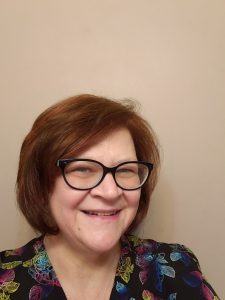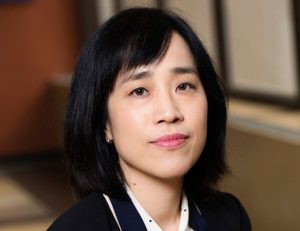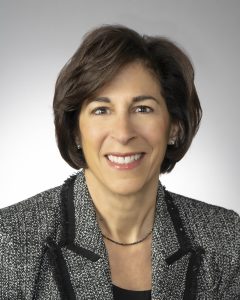Every year, Pittsburgh Magazine honors some of the region’s most distinguished nursing professionals. This year, four UPMC and University of Pittsburgh School of Nursing professionals have received “Excellence in Nursing” awards, and six additional professionals have received honorable mentions. These health care professionals continue to set the stage for excellence and display their commitment to nursing and health care in the Pittsburgh area.
We asked each recipient to share their inspiration for pursuing a nursing career, what they find most rewarding about their work and the advice they would give to someone beginning a nursing career.

Heather Fischetti, M.S.N., R.N.
Heather Fischetti, M.S.N., R.N., UPMC Senior Communities
Excellence in Nursing: Clinical Instructor/Educator
I knew I wanted to be a nurse from a very young age — I really had no other aspirations. My grandmother was a nurse in remote Inuit communities in Northern Canada. My experience as a Candy Striper in our small community hospital was where I learned for sure that I was going to be a nurse. I had the opportunity to help people and support the nursing staff. I went home every day feeling like I had made a difference and I knew that is what I wanted to do.
In Senior Communities, I have the privileged opportunity to have an impact on the lives of our residents as they age in place. I’ve been able to use my experience to support staff with the increased acuity we see in our transitional care unit, to manage chronic illness in our long-term care population, as well as guide how we care for people with advanced dementia on our memory care unit.
The challenges of the pandemic brought us closer than ever to our residents and provided a unique opportunity for us to learn and understand the impact of isolation on the mind, body and spirit. Staff learned to appreciate and understand their critical importance in the lives of our elders. I really enjoy working with students and my hope is that they learn to appreciate the value, personally and professionally, of working in the long-term care setting with this very special population.
For individuals who are entering this field, I would say, don’t limit yourself. Get experience in several areas. Never stop learning. I always said that if I lost my passion, I would leave nursing. Well, it’s 36 years later, and I’m still here.

Heeyoung Lee, Ph.D., CRNP, P.M.H.N.P.-B.C.
Heeyoung Lee, Ph.D., CRNP, P.M.H.N.P.-B.C., associate professor and department chair, Pitt School of Nursing, Department of Health & Community Systems
Excellence in Nursing: Advanced Practitioner
My older sister’s career as a medical surgical nurse played a significant role in guiding my path toward the nursing profession. Her experience and stories gave me valuable insight into the field, such as the day-to-day realities of patient care. She often spoke about the impact nurses have on patients’ lives. Her dedication made a significant difference in patient recovery, and this motivated and encouraged me to follow in her footsteps.
As a psychiatric mental health nurse practitioner (PMHNP), it is rewarding to witness a patient recover from illness while under my care and support. Moreover, it is gratifying when patients understand the role and contribution of a PMHNP to their health. As faculty at the University of Pittsburgh School of Nursing, teaching and guiding students in nursing profession, as well as observing their success and growth, are other sources of reward.
For individuals who are pursuing a career in nursing, identifying your passion and developing resilience are the most important aspects. The nursing profession demands dedication and hard work, frequently in difficult and emotionally challenging situations. Having a passion for your profession and equipping yourself with resilience will provide you with the motivation to persevere through tough times.

Sandy Rader, D.N.P., R.N.
Sandy Rader, D.N.P., R.N., president, UPMC Presbyterian Shadyside
Excellence in Nursing: Leadership
My mother was a strong influence in my life. She encouraged both my twin and I to become nurses. My twin and I went through our first degree in nursing together. The ability to help others was appealing to me, and this carried throughout my career.
I have appreciated the opportunity to influence more people, including staff, and patients, as I progressed through my career. Today, I enjoy developing strong teams and talent and influencing new leaders. I believe my role is to create and sustain a culture where staff and physicians can do their best work. Our staff care for our patients, and my job is to take care of our staff.
To our future leaders, work hard and always look forward. Not every day will be perfect, but you should feel good about the profession you have chosen. I consider it a privilege to do what we do.

Teresa Hagan Thomas, Ph.D., R.N.
Teresa Hagan Thomas, Ph.D., R.N., associate professor, Pitt School of Nursing, Department of Health Promotion and Development
Excellence in Nursing: Researcher
I decided to enter nursing to have a more tangible way to help people around me. I was drawn to how nursing focused on people holistically and not just their health or disease. I loved my prior studies in anthropology and international peace studies, but I wanted a more direct way to address health problems of the day. Nursing allowed me ample opportunities to learn, pursue ongoing studies and impact my community and world.
I most enjoy working in academia and research because I can both conduct my research and work with students. My research allows me to ask questions about how best to care for individuals holistically and find empirical ways to document and improve what matters most to them. My teaching allows me to learn from people with different perspectives and backgrounds than I have, which always improves our work.
I advise students to keep their eyes and minds open. There are many ways to develop as a nurse, and in most areas of the workforce there is a nurse working. Let your interests and passions guide your development – there is so much flexibility and creativity that could take you places you never thought a nurse could be.
UPMC and Pitt also received several honorable mentions:
Sara Dickson, B.S.N., R.N., UPMC
John Fairbaugh, M.S.N., R.N.-B.C., chief clinical information officer, UPMC
Mary Kay Gill, M.S.N., R.N., UPMC Western Psychiatric Hospital’s Child & Adolescent Bipolar Spectrum Services
Young Ji Lee, Ph.D., M.S., R.N., associate professor of nursing and medicine, Pitt School of Nursing, vice chair of Administration, Health & Community Systems
Jessica Sarno, D.N.P., C.R.N.P., UPMC Hillman Cancer Center.
Marcy Zoller, C.R.N.P., UPMC Shadyside








